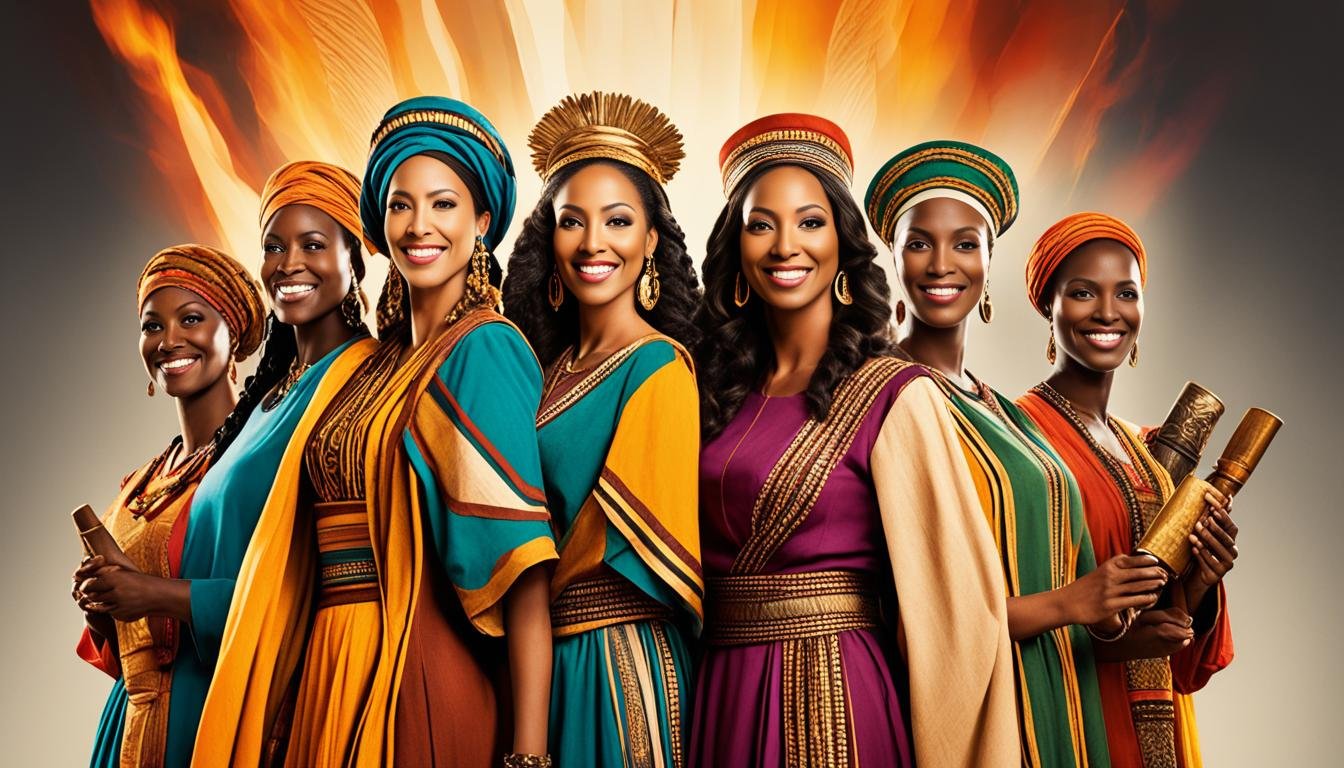Throughout biblical history, men have often taken center stage as religious leaders, leaving the role of women in religious leadership somewhat overlooked. However, women have played significant roles in the Bible, including as religious leaders and preachers.
In this section, we will explore the significance of female religious leadership in biblical times and answer the question, “who was the first woman preacher in the Bible?” We will examine the historical and cultural context of biblical times and discuss notable female figures who played important roles in shaping religious history.
Key Takeaways:
- Women played significant roles in religious leadership in biblical times.
- Notable female figures in the Bible have contributed to religious history.
- We will delve into the historical and cultural context of biblical times in the next section.
Women in the Bible: Historical Context and Significance
Women have played a crucial role in biblical times, despite the prevailing cultural expectations and societal norms. It was not unusual for women to be viewed as inferior to men and relegated to subservient roles. However, there were notable exceptions, with several female figures emerging as leaders in their respective communities.
One such example is Deborah, who served as a judge and a prophetess in Israel during the 12th century BCE. She was highly respected for her wisdom and leadership qualities, and her influence extended beyond her own people.
Another notable figure is Huldah, a prophetess who was consulted by King Josiah in the 7th century BCE for guidance on religious matters. Her insights were highly valued and contributed to the religious reforms implemented by Josiah.
Despite these examples, the role of women in religious leadership was often marginalized and overlooked. However, their contributions were essential in shaping the cultural and social landscape of biblical times.
Examining Female Preachers in Christianity
Throughout history, Christianity has been shaped by powerful female leaders who have spread the teachings of the faith with passion and conviction. Despite cultural and societal norms that often restricted women’s roles in religious leadership, there are a number of biblical women evangelists who made a significant impact.
The New Testament provides examples of female preachers, including Mary Magdalene, who was the first to see the resurrected Christ and delivered the news to the disciples, and Phoebe, who was a deaconess in the early church and is mentioned in Paul’s letter to the Romans (16:1-2). Other notable biblical women preachers include Lydia, Priscilla, and Junia, all of whom played important roles in spreading the gospel during the first century.
Beyond biblical times, there have been countless influential female preachers and evangelists, including Aimee Semple McPherson, who founded the Foursquare Church in the 1920s and became one of the most well-known religious leaders of her time, and Mother Teresa, who dedicated her life to serving the poor and sick in India and was recognized with numerous honors, including the Nobel Peace Prize.

Female Preachers Making a Difference
Today, female preachers continue to play an important role in Christianity, providing spiritual guidance and leadership to congregations around the world. Joyce Meyer, Priscilla Shirer, and Beth Moore are just a few examples of contemporary female preachers who have inspired millions with their teachings and outreach efforts.
“The fact that I am a woman does not make me a different kind of Christian, but the fact that I am a Christian does make me a different kind of woman.” – Elisabeth Elliot
The legacy of women in religious leadership is an important part of Christian history and continues to inspire women around the world to step into leadership roles in their own communities and beyond.
Unveiling the First Woman Preacher
After an extensive examination of biblical texts, it has been determined that the first woman preacher in the Bible was Deborah. Deborah was a prophetess and judge who played a crucial role in rallying the Israelites against their enemies and restoring peace and order to the land.
In the book of Judges, Deborah is described as a woman of great wisdom and authority, who held court beneath a palm tree in the hill country of Ephraim. She was sought out by many in search of her divine guidance and leadership.
Despite living in a patriarchal society, Deborah was able to rise to the position of a respected leader and preacher. Her preaching and guidance were integral to the Israelites’ victory over their enemies, and her legacy continues to inspire female religious leaders to this day.
Deborah’s Impact on Biblical History
Deborah’s role as the first woman preacher in the Bible laid the foundation for future generations of female biblical preachers. She proved that women could hold positions of authority in religious leadership and use their voices to inspire and guide others. Her impact on biblical history is immeasurable, and her legacy continues to be celebrated to this day.
The Influence of the First Woman Preacher
The first woman preacher in the Bible broke barriers and paved the way for female biblical preachers throughout history. Her story is a testament to the strength and resilience of women, and her impact on Christianity is still felt today.
By challenging the status quo and embracing her role as a female religious leader, she empowered other women to follow in her footsteps and helped to shape the future of Christianity. Her message of equality and inclusion continues to inspire and guide millions of people around the world.
As we look back on the legacy of women in the Bible and female biblical preachers, we can see how this first woman preacher paved the way for others to rise up and share their voices with the world. Her powerful message and leadership continue to be celebrated and honored today, as we work towards a more inclusive and equitable world.
Let us continue to recognize and celebrate the incredible contributions of all female religious leaders, past and present, and work towards a future where everyone has the opportunity to share their unique gifts with the world.
The Legacy of Female Preachers
Throughout biblical history, women have played significant roles in religious leadership. From the first woman preacher to the many female biblical preachers who followed her, women have proven themselves as valuable and effective spiritual leaders.
Despite the challenges they faced in a male-dominated society, women persisted in using their voices to share the teachings of Christianity. Female preachers in Christianity have continued to make a lasting impact, inspiring generations of women to pursue religious leadership positions.
Today, the legacy of women in the Bible can be seen in the achievements of modern-day preachers like Joyce Meyer and Beth Moore, who have successfully navigated the challenges of being a female preacher in Christianity.
As society continues to progress towards greater gender equality, the voices and contributions of female preachers are being increasingly recognized and celebrated. Women in the Bible have paved the way for future generations of female religious leaders, empowering them to share their faith and make a positive impact on the world.
In conclusion, the legacy of female preachers is a testament to the strength and resilience of women in the face of adversity. Their impact on biblical history and the ongoing contributions of female preachers in Christianity serve as a reminder of the powerful role women can play in religious leadership.
FAQ
Who was the first woman preacher in the Bible?
The first woman preacher in the Bible was Deborah, a prophetess and judge mentioned in the Book of Judges.
Can you provide examples of other biblical women preachers?
Yes, there are several notable female preachers in the Bible, including Miriam, Huldah, Anna, and Priscilla.
What roles did women play in biblical times?
In biblical times, women mainly served as wives, mothers, and caretakers. However, there were also women who held positions of power and authority, such as queens, prophetesses, and leaders in religious and social contexts.
What impact did female religious leaders have during biblical times?
Female religious leaders in biblical times played crucial roles in guiding and influencing their communities. They acted as spiritual advisors, prophets, and teachers, and their leadership often brought about significant social, moral, and political changes.
Were there any female preachers in early Christianity?
Yes, there were several female preachers and evangelists in early Christianity. Some notable examples include Mary Magdalene, who was one of the first witnesses to the resurrection of Jesus, and Phoebe, who served as a deacon and a patron of the early church.
How did the first woman preacher impact biblical history?
The first woman preacher in the Bible, Deborah, played a crucial role in the military victory of the Israelites and the establishment of peace in the land. Her leadership and prophetic abilities inspired others and showcased the importance of women in religious and societal affairs.
What is the lasting legacy of female preachers in the Bible?
The legacy of female preachers in the Bible is one of empowerment, inspiration, and paving the way for future generations of women in religious leadership. Their stories continue to serve as a reminder of the importance of recognizing and promoting the voices and contributions of women in faith communities.

Rockin’ the faith, one verse at a time!
Growing up, the Bible’s stories deeply impacted me. Now, with over 15 years of preaching experience, I blend timeless teachings with modern technology, making them relevant for today’s world.
Bible Hub Verse is my platform to share historical insights and thought-provoking articles, exploring both familiar and uncommon Christian topics. My passion is building a welcoming online space for everyone to learn, grow in their faith, and discover the Bible’s enduring message.
Join the journey!
God bless you.









